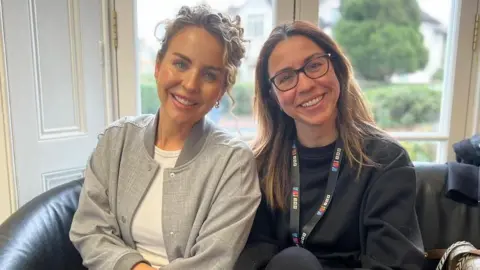Foster children failed by state, says Lydia Bright
 Lydia Bright
Lydia BrightReality TV personality Lydia Bright has called for more help for foster children when they leave care at 18 years old, saying they are being "failed" by the state.
The Only Way Is Essex (Towie) star grew up alongside foster siblings, and her parents have continued to foster for more than 30 years.
"You cannot just wash your hands with these vulnerable young adults at 18 and expect them to just go on and thrive in society," Bright told the BBC.
"They need the support, we're letting go of them too young and we're setting them up for failure."
'Can't let go'
Bright has been guest editing the BBC Essex Breakfast Show throughout this week.
She said her parents had fostered ever since she could remember, describing it as "a massive part of my world".
The 34-year-old questioned whether any 18-year-old could live independently and feared there was a risk these children could fall into gangs and crime.
"The state is these young adults' parents, and they are failing them," said Bright, who found fame on Towie in 2010.
"A lot of [foster carers] feel like at 18, their duty's done, and my mum's belief is that when you do have a foster child, they are with you for life - you can't let go."
 BBC Essex
BBC EssexAbout 800 children were in foster care in Essex at the beginning of 2025, with 492 foster carers in the county.
Essex County Council cabinet member for children's services, John Spence, has said "foster care is under threat" due to the falling numbers of families coming forward.
When a foster child turns 16 years old, the local council must write a "pathway plan" which helps them prepare for leaving care, including plans for health, education and financial management.
At 18, a foster child is no longer in the care system, although local authorities must provide support until they are 25, including assigning a personal adviser who stays in touch once.
A foster child may stay with their foster family beyond 18 up to the age of 21 under a Staying Put arrangement, but Bright told presenter Sonia Watson the system needed changing.
"Foster carers can't afford to keep their child placement within the Staying Put scheme because the fees are reduced dramatically; you don't get the usual fee that you would get for the child," she said.
"Some people rely on that, it's their career, they rely on that to pay their bills – so it's not always available."
 PA Media
PA MediaBBC presenter and author Ashley John-Baptiste, who grew up in several care settings, echoed the concerns.
"You tell me one 18-year-old person who you would say is ready to live as a fully-fledged adult – it's just not possible, let alone when you're a looked-after child," he told BBC Essex.
"It's what they call it when you turn 18 – 'the care cliff' – because you get forms of support as a looked-after child and teenager, and the moment you turn 18, the vast majority of that support goes away."
Support
A Department for Education spokesperson said that the children's social care system it inherited was "failing to meet the needs of the country's most vulnerable children".
"The Children's Wellbeing and Schools Bill marks the biggest overhaul of children's social care in a generation and is a key step towards delivering the government's mission to break the link between young people's background and their future success."
They continued: "That's why, as part of our Plan for Change, key measures will include introducing new corporate parenting responsibilities on the government and providing stay close support for care leavers."
Essex County Council, Southend-on-Sea City Council and Thurrock Council all said they were committed to supporting care leavers.
Follow Essex news on BBC Sounds, Facebook, Instagram and X.
